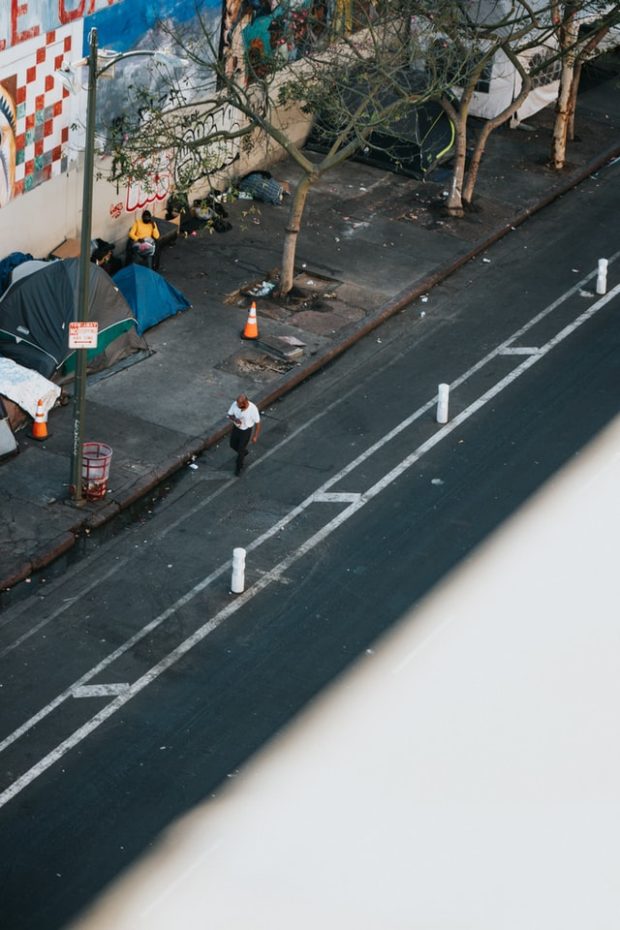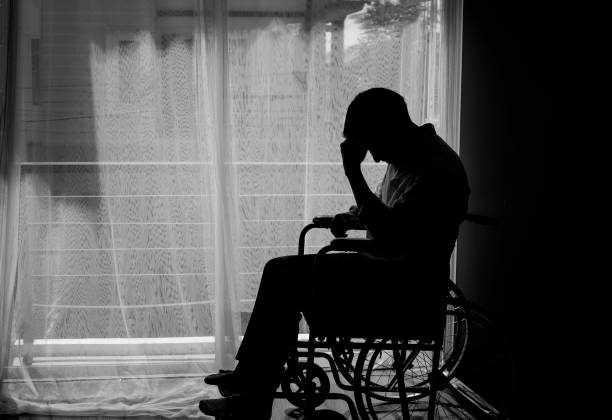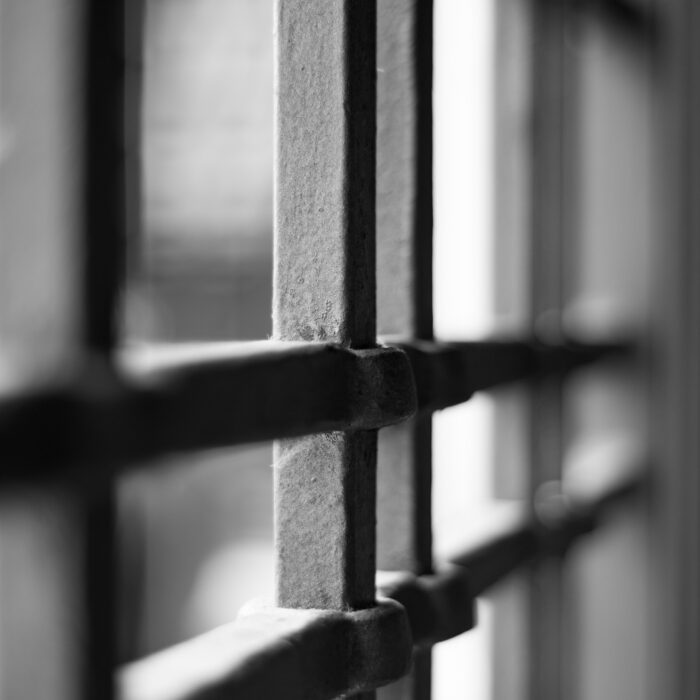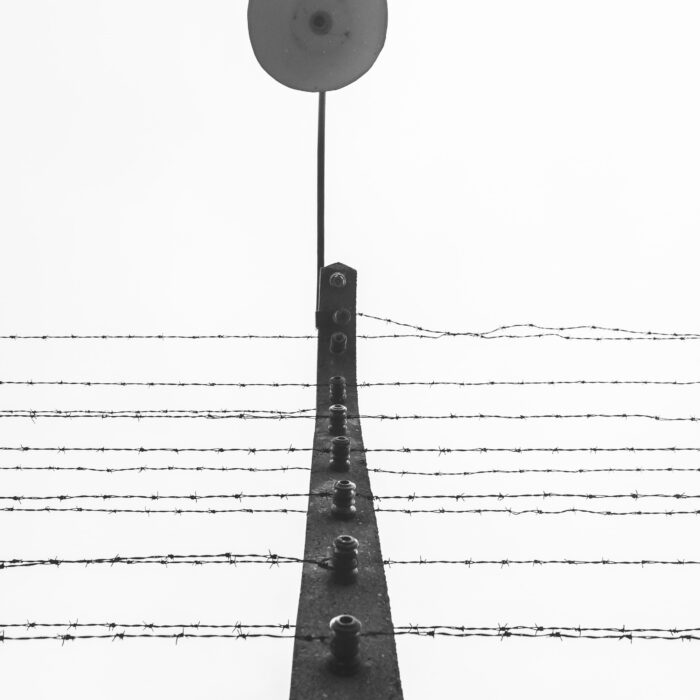You have no items in your cart. Want to get some nice things?
Go shopping
Seanna slumps, exhausted. Her tent is rat-shredded, pocked with holes, covered with an old tarp. Inside, her bed is a plastic mattress covered with dumpster blankets and a damp pillow. Two bags of clothes beside. A Coleman stove crouches in one corner – a kettle on it she hasn’t used in years.
She sits on the pavement outside her tent, squinting at the people as they walk by. Her old green pants torn up to the knee, denim shirt worn and faded white, shoes wrapped up in duct tape. A front tooth fell out yesterday, now the other one feels loose, could be out by tomorrow. One thieving loss after another.
Other tent dwellers are camped out beside her. “The damned derelicts of the damned old defeated world” she calls them. They are loud, they scream, convulse, cough up blood, pass out. Sometimes they are rescued, sometimes not. They leave her alone now – anything she ever had of value already filched years ago. She’s old and doesn’t ask for much. No one speaks to her. She speaks to no one.
At night she thinks: What is there now to sustain? And why on this earth should I be sustained? Everyone she once knew – her people, her family – gone – distant or dead. Sometimes she’s got money for Vodka, sometimes not. The head that wakes her every morning vice-gripped with pain, the bones fevered with the cold, her pulse fluttering like a humming bird trying to escape.
This morning she pushes a clump of matted hair away from her face as she watches the parade of the Haves marching by in lockstep on their way to work. God. They are so determined to live their lives as if it’s worth it. As if life has something to offer them, or they it. She feels sorry for them, never envies what they have. She knows what they have doesn’t add up to anything. It’s just they don’t know it yet.
If she can cop a few coins, she’ll eat. If not, she won’t. Today, she’s determined to match the enthusiasm of the paraders. She says “Good morning!” to each one. And smiles.
This smile – a masterpiece. This smile a life’s work. This smile costing her everything she ever was: it’s a childhood memory of a swing and a party dress, a moment of laughter shared with a man she loved who died twenty years back. This smile dredged out from the earthed ruins of her happiness. She dredges it out because she has to. It’s a question of survival, survival a question of habit, habit hard to shake.
A young man passes by – he catches that smile – it reminds him of his aunt he hasn’t seen in years, but he’s not aware of that – he just knows he must go back. He stops, retraces his steps, puts a five-dollar bill in her paper cup.
“You have a nice day,” he says.
“Thank-you, you too.” she says and pockets the bill.
He walks on.
She’ll eat tonight. An egg salad sandwich with a large cup of coffee, and cream and sugar in it.
She knows this, but doesn’t give it much credit – the fact of eating, the fact of living on. She thinks about the homicidal circumstances of her life. It’s like her life has been bullied down by the days, and willed forward beyond its end date, and she doesn’t know why. Why does she – why does it – bother? What’s left now to hold on to? Clear enough: nothing. But it’s a stupid, blind-eyed brute, the will to survive – and hard to wrestle it down.
At four o’clock it starts to rain, a driving, soul-flattening rain. She crawls into her tent and sits on the mattress. That tarp is supposed to protect her, but it’s no match. The rain soaks through and drenches her, soaks her blankets, her pillow, floods out the bottom of the tent. This is bad. As bad as it can get.
Seanna crawls out. No point in being in there any more. The street is filling up fast and flooding.
Her neighbour – a meth addict who pitched in beside her months ago – is sitting folded up and hugging his knees, his hoody and jeans soaked through. Like her, he’s staring at the rain. He’s disheveled and beaten down, drowning, like her, a creature almost obliterated by the rain, shivering and suffering and enduring and cold to the bone and to the marrow of the bone.
Debris floats by – coat hangers, a baby’s shoe, a plastic seat cover, a doll’s legs, wooden blocks – she watches it all go by. Hasn’t got the will to go anywhere to get out of the rain. She’s a part of it now, a part of this downpouring – feels absorbed and taken up by it – feels comfort. The last, no-hope kind of comfort. A release, a capitulation. All resistance gone.
At the curb just in front of her something floats by, sticking up out of the water. She reaches out for it – it’s a small green plastic vase. She grabs it. Turns it over in her hands. For a fleeting second it reminds her of –
A promise once given her, long ago, by the man who loved her. A promise he couldn’t keep, and with it: a white lily. How she put that flower in a vase, and the vase on her white windowsill. How he kissed her then. The black and white tiles on the kitchen floor. Her red wooden table. His eyes.
Out of kindness to her, this memory dissolves in an instant and washes away with the rain. But she keeps the plastic vase, tucks it into her pocket and watches as the waters rise, as the wide, rivering street flows by.
The meth boy beside her curls up into a ball, like an armadillo, as if making himself small will protect him somehow, as if, in his way, he is still capable of resistance.

Rosalind Goldsmith
Rosalind Goldsmith lives in Toronto. She has written radio plays for CBC Radio Drama and a play for the Blyth Theatre Festival and has also translated and adapted short stories by the Uruguayan writer, Felisberto Hernandez, for CBC Radio. Her short stories have appeared in journals in the UK, the USA and Canada, including Litro UK, Burningword Literary Journal, Filling Station, the Blue Nib, Fairlight Books, the Chiron Review, Into the Void (2021 Pushcart nominee for “Leaving You”) and Fiction International. New stories will appear in 2021 in Stand, Bookends and others.




